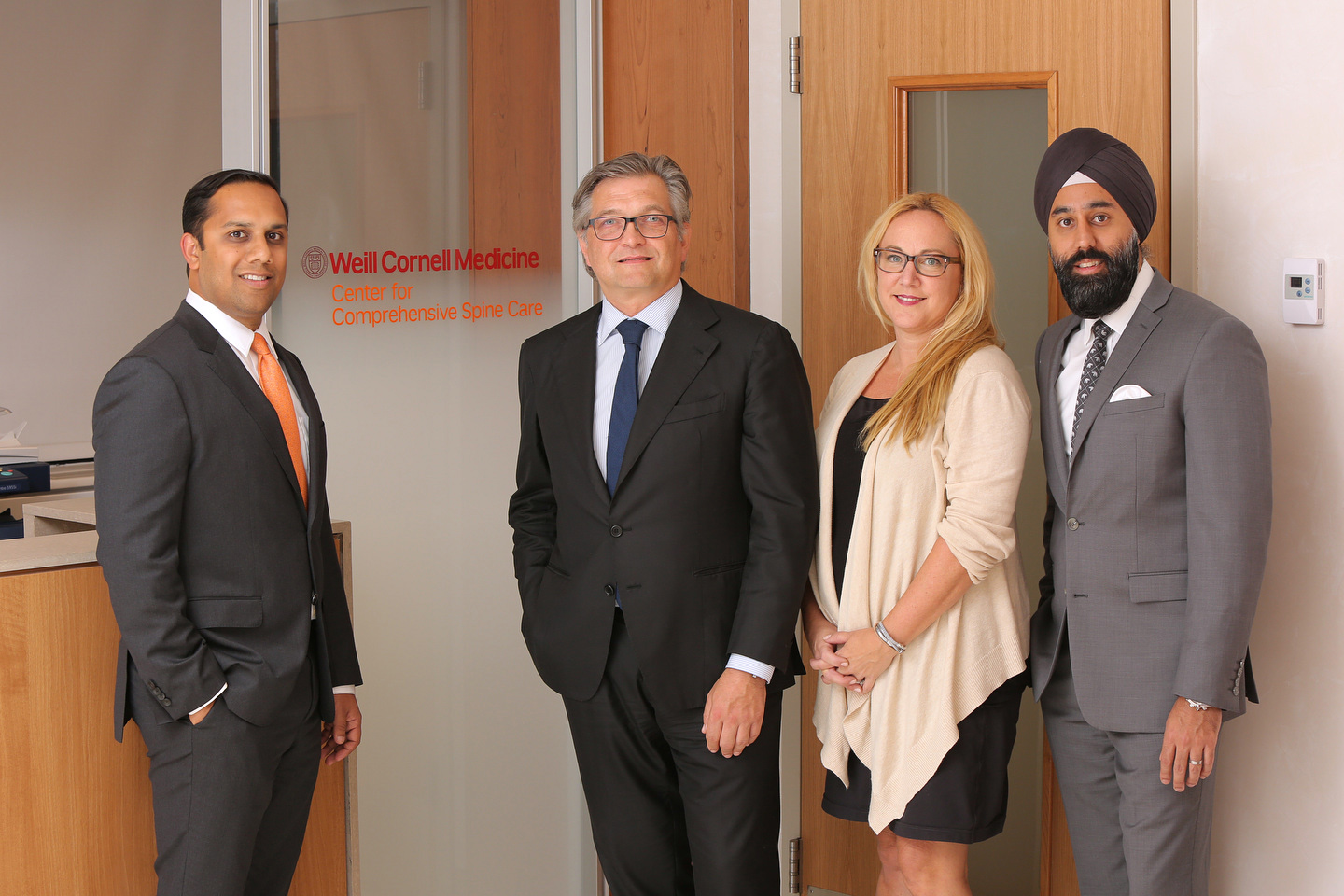Spine care center has new care model, in-house specialists
By Timothy Malcolm

In 2002, a ceiling at a crumbling commercial structure fell atop now-retired New York City firefighter Lt. Rick Garcia, twisting him and injuring his back and knee. He underwent knee surgery and, whenever his back flared, underwent rehabilitation while continuing to exercise. But early in the summer of 2016, Garcia couldn’t stay upright. The injury had caught up to him.
A Long Island resident and father of three, Garcia saw many physicians in multiple locations and was told he’d need surgery that would require inserting rods in all of his vertebrae – until he came to the Center for Comprehensive Spine Care at Weill Cornell Medicine.
Patients affected by spine-related conditions and injuries, like Garcia, would typically have to visit multiple practitioners to address a spectrum of related fields such as surgery, neurology and rehabilitation. The new Center for Comprehensive Spine Care exemplifies a different philosophy, offering patients centralized, multidisciplinary care in one building.
“Historically spine care has been very fragmented. It’s a challenge because, to comprehensively take care of spine patients, it requires many sub-specialties,” said Dr. Roger Härtl, director of the spine center, professor of neurological surgery at Weill Cornell Medicine, and a neurological and spinal surgeon at NewYork-Presbyterian/Weill Cornell Medical Center. “Now, when a patient comes in they may see one practitioner or multiple practitioners at the same time. And they come into an environment where everyone talks to each other.”
The Center for Comprehensive Spine Care is housed in a cutting-edge facility on East 59th Street and led by Härtl and co-directors Dr. Bridget T. Carey, Dr. Neel Mehta and Dr. Jaspal R. Singh. Under their leadership, 15 physicians take a multidisciplinary approach to treat patients suffering from back, neck, hand and joint pain, arthritis, spinal stenosis, sciatica, rotator cuff injuries, disc injuries and carpal tunnel syndrome, among other conditions.
Using expertise spanning pain management, physical medicine and rehabilitation, neurology and spinal surgery, the physicians develop and implement personalized treatment plans that strive to avoid surgery, following patients’ progress through the program. If physicians determine surgery to be the most appropriate treatment option, patients may undergo lateral access surgery, a procedure that is designed to shorten recovery time. All surgeries are minimally invasive using state-of-the-art technology and take place at NewYork-Presbyterian. An event on Feb. 15 will introduce patients to the center and explore the latest research and treatment options in spine medicine.
“My goal when I started this 10 years ago was to make this about the patients and optimizing patient care and outcomes, minimizing the number of surgeries or injections we do,” Härtl said. “We did this because we want to improve patient care.”
The center’s emphasis on continuum of care comforted Garcia, who through a family friend connected first with Singh for an initial consultation, then with Härtl to visit the Center for Comprehensive Spine Care. He instantly felt comfortable listening to Härtl answer his questions. Then Härtl suggested Garcia see neurologist Dr. Naomi Feuer.
“He walks out of the room, and two seconds later in comes the neurologist,” Garcia said, relieved he didn’t have to schedule new appointments. “I had no idea there was a neurologist right there and available the same day.”
On Feb. 6, Garcia checked in at NewYork-Presbyterian to undergo a minimally invasive procedure tailored just for him, fusing his L5 and S1 vertebrae and relieving pressure from L1 to S1. He praises Härtl, Feuer and Singh, who he said exuded confidence, sending the message that he was receiving the best possible care.
“Being a firefighter, I just feel you have to be confident in what you’re doing,” said Garcia, who also suffers from a condition characterized by numbness of the fingers and toes – stemming from working at Ground Zero on 9/11. “I’m so confident here, as opposed to what I was going through elsewhere, because they were talking to me like I was on wheelchair’s door.”
Timothy Malcolm is a freelance writer for Weill Cornell Medicine.
Media Contact
Get Cornell news delivered right to your inbox.
Subscribe